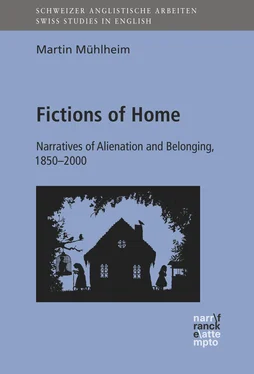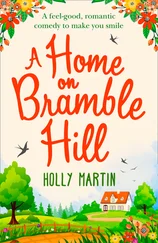In part, this is because Tom follows his father’s explicit commands to the letter while failing to grasp the spirit of his words (and, indeed, the father’s actions, which frequently run counter to his own precepts). Mr. Tulliver’s views may be as rigid as Tom’s, but he is far less dogmatic when it comes to acting on his beliefs. This is evident, for instance, in how Mr. Tulliver treats his sister. After a quarrel with his wife’s elder sister, the proud miller decides to settle all his debts with Aunt Glegg and her husband. To do so, however, he must reclaim the money he has lent to his own sister Gritty, “who had married as poorly as could be” (52; bk. 1, ch. 7). Though initially he seems determined to reclaim what is his due, Mr. Tulliver ultimately cannot bring himself to take the money from his sister, for he suddenly realizes that Maggie, too, might one day depend on her brother for help (71; ch. I.8). On his deathbed, Mr. Tulliver accordingly urges Tom to take care of both Mrs. Tulliver and Maggie (291; bk. 5, ch. 7). For Tom, however, taking care of someone seems to comprise material security only, as becomes clear towards the end of the novel, when he assures his sister that he will always give her money if she is in need, while at the same time making it clear that, as a ‘fallen’ woman, she will no longer be welcome in his home (392–393; bk. 7, ch. 1). In thus neglecting Maggie’s emotional needs, Tom violates the spirit of his father’s dying wishes even as he attempts most scrupulously to obey them.
At the same time, it would be unfair to suggest that Mr. Tulliver’s actions are always guided by lofty ideals, and indeed in at least one crucial respect he acts very selfishly towards his own son. When, early on in Eliot’s novel, Mr. Tulliver explains why he wants to send Tom to a tutor, he admits that one of his motives is to keep the boy from becoming his rival:
Why, if I made him a miller an’ farmer, he’d be expectin’ to take to the mill an’ the land, an’ a-hinting at me as it was time for me to lay by an’ think o’ my latter end. Nay, nay, I’ve seen enough o’ that wi’ sons. […] I shall give Tom an eddication an’ put him to a business, as he may make a nest for himself, an’ not want to push me out o’ mine. (15; bk. 1, ch. 3)
In this passage, Mr. Tulliver does not envision the family home as a “refuge from the competitive, insecure, amoral world of the market” (Howarth 169). Instead, he portrays it as a contested piece of propertyproperty that the patriarch must protect even from his own son. Tom’s educationeducation is thus not intended by his father to further the son’s spiritual growth, but instead can be seen as Mr. Tulliver’s conscious attempt to curb Tom’s ambition to become a miller by thwarting or ‘re-directing’ his talents.
There is, then, an important element of generational conflictconflict to The Mill on the Floss , as suggested among other things by the narrator’s differential use of namesnames and naming in the novel.108 Generally speaking, Eliot’s narrator refers to the oldage & aginger characters by their family namesnames and naming: ‘Mr. and Mrs. Tulliver,’ ‘Aunt and Uncle Glegg,’ or ‘lawyerlawyers Wakem.’ Indeed, even attentive readers may be forgiven for failing to remember, say, that Mr. Tulliver’s first name is Jeremy, as it is mentioned only once and in passing (17; bk. 1, ch. 3). Moreover, while Mrs. Tulliver’s first name – Elizabeth, or Bessy – occurs much more frequently (three and seventy-nine times, respectively), in all cases except one this happens in one of three particular contexts: (a) other characters use the name Bessy in passages of direct speech; (b) the name Bessy appears in indirect speech; and (c) the narrator calls Mrs. Tulliver Bessy in passages that are focalizedfocalization through Mrs. Tulliver’s husband or relativesrelatives (examples for each of these cases: 46–47; bk. 1, ch. 7). This stands in marked contrast with the narrator’s virtually exclusive use of first namesnames and naming for Maggie, Tom, and Philip even when they are not seen through the eyes of other characters.109 At first sight, the effect of this subtle, but nevertheless clear distinction seems relatively obvious, for by putting us, as it were, on a first-name basis with the younger characters while at the same time retaining a polite distance from their elders, the narrator arguably prompts us to identify more closely with the former rather than with the latter.
This, however, is only part of the picture, for, in addition to age or generation, another factor determining the narrator’s use of first as opposed to family namesnames and naming is a character’s social status and degree of economic independence. This is most readily apparent in the case of two characters who belong to an oldage & aginger generation than Maggie and Tom, but who both have long formed part of the Tulliver householdhousehold as faithful servantsservants and domestics to the family. Reflecting the fact that these servants are dependents, the narrator does not hesitate to refer to them by their first namesnames and naming, Kezia and Luke, even when they are not seen through the eyes of other characters (e.g. 211 and 213; bk. 3, ch. 8). The underlying logic at work here is that of the nineteenth-century household, which Fredric JamesonJameson, Fredric describes as “an ambiguousambiguity category”:
[The householdhousehold] does not preserve the blood jealousies of the older clans but yet is not technically purely familial either, in the sense of some later extended family. Rather, these households very much include servantsservants and domestics […]. ( The Antinomies of Realism 102)
In this particular social context, identity and honor are determineddetermination by an individual’s position within a master’s householdhousehold. We can therefore say that, just as the common designation of slavesslavery as ‘boys’ or ‘girls’ expresses their permanently subordinate position (BlackburnBlackburn, Robin 11), so the narrator’s use of first namesnames and naming for Kezia and Luke signals their ‘lower’ and dependent status, irrespective of these characters’ age. However, while in one sense this aligns the two servantsservants and domestics with the younger characters in Eliot’s novel, the key difference is that, in theory, someone like Tom ought at one point to gain honor and independence by assuming his father’s position as master of the household – and it is precisely this ‘natural,’ patriarchalpatriarchy succession that Mr. Tulliver proves himself desperate to prevent by sending Tom to schoolschool in order to learn a trade other than milling.
And yet, it is one of the many bitter ironies in The Mill on the Floss that Tom’s schoolingschool turns out to be doubly inadequate even from Mr. Tulliver’s problematic point of view. For one thing, Mr. Tulliver originally wanted Tom to learn more about the practical world of business and less about things that lie “mostly out o’ sight” (20; bk. 1, ch. 3). However, following the ill-founded advice of a friend, Mr. Tulliver sends Tom to Reverend Stelling, who provides the boy with the kind of classical educationeducation cherished by humanist proponents of BildungBildung , but largely irrelevant to a future VictorianVictorian tradesman. Tom’s business-loving uncle Deane is later quick to point this out to the frustrated nephew:
Your Latin and rigmarole may soon dry off you, but you’ll be but a bare stick after that. Besides, it’s whitened your hands and taken the rough work out of you. And what do you know? Why, you know nothing about book-keeping, to begin with, and not so much of reckoning as a common shopman. (190; bk. 3, ch. 5)
Contrary to his intention, Mr. Tulliver has thus failed to provide Tom with an educationeducation that would enable his son to “make a nest for himself.” Moreover, Mr. Tulliver will eventually lose his beloved mill to lawyerlawyers Wakem and must then depend on Tom to restore it to the family. In a painfully ironicirony twist of fate, the son whom he regarded as a rival and threat to his propertyproperty thus eventually becomes the miller’s only hopehope to regain the lost home.
Читать дальше












